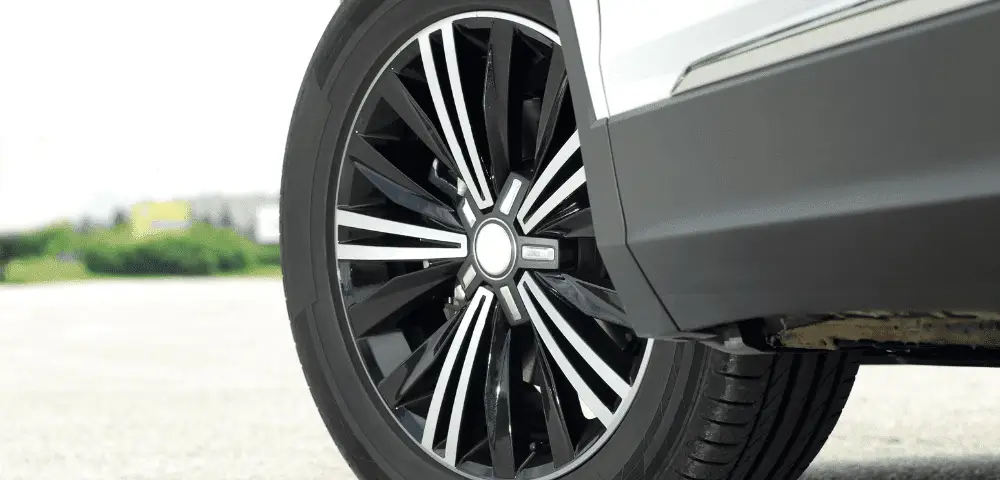Have you noticed a grinding noise when driving? Is this noise coming from the front wheels?
If you answered yes to both of these questions, you’re probably dealing with one of the following possibilities.
For one, it could be that the metallic material in the brake pads is rubbing against something.
Or, perhaps one of the parts that make up the braking system is worn– either the brake caliper, brake pad, or brake rotor.
It could also be a problem with the tires, particularly the CV joint or a bad wheel bearing. In this post, I’ll delve deeper into the causes of grinding noise from the front wheel when driving.
Why Does My Car Sound Like It’s Grinding When I Drive?
If you’ve been hearing a grinding or rubbing noise when you drive, you either have a faulty braking system or defective tires.
Defective tires
If the grinding noise is coming from the tires, then the most probable cause is worn-out bearings.
Positioned within the wheel hub, the wheel bearing ensures that the tire spins smoothly by minimizing friction. Each wheel has an individual set of wheel bearings. Unfortunately, they can become worn over time, compromising their ability to reduce rolling friction.
The question is, what does a bad wheel bearing sound like? Well, the most likely symptom is a grinding sound when driving. You may also experience vibrations, especially when you’re driving at high speeds. If you suspect this to be the problem, consider getting a tire inspection.
Faulty braking system
If you hear grinding noises from the braking system, then it’s likely coming from one of these three parts:
Brake caliper
If you look keenly at your car’s front wheels, you’ll notice some disc-shaped parts. These are known as brake calipers, and they initiate friction with the brake rotors; hence, enabling your car to stop.
A damaged brake caliper might struggle to release the brake rotor. Worse even, it can cause your car to drift in one direction. So if you notice a rubbing sound every time you brake, inspect the calipers to ensure they’re not damaged.
Brake rotor
When it comes to maintaining your car’s braking system, most car owners only focus on the brake pads and calipers. While this is important, there are other crucial parts like the brake rotors.
The rotor is the part that the brake pad clamps onto so as to bring your vehicle to a stop. If any of the rotors are damaged, you’ll start hearing weird squealing noises.
Brake pad
As stated earlier, the brake pad is designed to exert pressure or clamp onto the rotors so as to initiate the braking process. Unfortunately, the brake pads wear out over time. And when this happens, you’ll notice an unpleasant rubbing noise every time you step on the brake pedal.
This sound stems from the metal-to-metal contact caused by the pads. It means the metal brake pad backing plate is rubbing against the rotor metal causing the scraping noise.
Step By Step Diagnosis of Why It’s Having Grinding Noise
Here’s a detailed guide to help you diagnose a grinding noise problem:
Step 1: Start your vehicle
The first thing you’ll want to do is to start your vehicle and pay a lot of attention when doing so. Does the clunking noise begin as soon as you start the car? Or, does it start a few minutes later when the engine is up and running?
If there’s no grinding noise when you start the car, proceed to step 5. However, if you hear the knocking noise, move on to step 2.
Step 2: Lift the hood and locate the alternator, water pump, and power steering pump
This stage involves identifying the specific part of the engine that’s responsible for the grinding noise.
If you don’t have a good knowledge of the engine system, now might be the best time to look it up online or consult the owner’s manual.
Usually, the most common causes for the rubbing noise are the alternator, water pump or power steering pump. So you’ll want to examine these parts first:
- Alternator – this is a cylindrical element that’s connected to the side of the engine using bolts. Its role is to convert chemical energy into usable electrical energy. Specifically, the electrical energy is used to recharge the engine’s battery and other electrical parts of your car.
- Water pump – you’ll find the water pump mounted to the front of the engine. It’s the part responsible for delivering coolant to the engine. As you probably know, the coolant is the fluid that cools the engine; hence, preventing it from overheating.
- Power steering pump – this part is located on the top of the engine at the point where it connects to the crankshaft. It’s tasked with pressurizing the transmission or hydraulic fluid so as to make steering easy.
Step 3: Listen to the alternator with a piece of hose
Once you’ve identified where these parts are, the next step is to listen to them- starting with the alternator.
To do this, look for a rubber hose then place one end at the alternator and the other end up to your ear. Listen keenly for any unusual grinding sound. If the noise is indeed coming from the alternator, you should consider replacing or repairing it.
Step 4: Listen to the water pump and power steering pump
If the alternator isn’t the culprit, listen to the remaining two components; one at a time. Follow a similar process. This means placing one end of the hose up to your ear and the other on the pump.
If you notice any of these elements producing a grinding noise, you’ll want to get them repaired or replaced.
Step 5: Drive the vehicle and test the brakes
As mentioned earlier, faulty brake parts can also cause a scraping noise.
To determine this, gently step on the brake pedal when driving. If the grinding sound isn’t noticeable, then step on the brakes slightly harder. If the noise intensifies, there’s a good chance that worn brake pads are responsible.
If you’re driving, look for a safe spot to pull over and examine the pads further. Ideally, they should be ¼ inches thick or more. If they’re thinner, consider replacing them with new brake pads.
But, if they’re in good condition, look for other potential problems with this system, namely:
- Inadequate lubrication
- Debris trapped in the brakes
- Worn-out shims or brake rotors
Alternatively, take your car to a professional mechanic so you can get the brakes inspected more thoroughly.
Step 6: Drive the vehicle and make a right and left turn
If there’s nothing wrong with the brakes, the next component you should examine is the wheel bearing.
To gauge its performance, drive your car and make a right- and left turn. Does the grinding noise get louder when you turn in a particular direction? If so, you’re likely dealing with a damaged wheel bearing.
Step 7: Drive the vehicle and listen carefully as you change gears
Do you hear a rubbing noise every time you change gears? If so, the clutch could be to blame. It’s either become worn out or needs a bit of adjusting.
However, this could also hint at a problem with your car’s transmission. Whatever it is, it’s important to get your car examined by a mechanic.
Step 8: Check for a grinding noise when driving at low speeds
Do you hear squeaking noises anytime you’re driving at low speeds? If you do, the most likely culprits are a failing alternator, defective brakes or issues with the constant velocity joints.
By now, you’re familiar with the alternator and braking system. What might sound foreign are the constant velocity joints. Often abbreviated as CV joints, they’re designed to transfer power from the engine to the tires.
If the CV joint (s) has an issue, you’ll likely hear a grinding noise coming from the wheels; especially when you make turns.
Can I Drive With a Grinding Wheel Bearing?
Most drivers continue driving even when they notice their car making unusual grinding noises at the front wheel. However, you should never attempt to drive with a grinding wheel bearing.
Instead, get those wheel bearings checked and possibly replaced. Driving on worn-out bearings puts unnecessary stress on the wheel hubs, CV joints, and even the transmission. This can lead to more expensive repairs down the road.
Is It Safe to Drive With a Grinding Noise?
No, it’s not safe. As tempting as it can be, you should never ignore grinding noises, especially if they’re coming from the front wheels.
Any rubbing noise produced from this area could indicate worn-out brakes or problems with the transmission or tires. Be sure to address this issue right away, lest you lose control of your car when driving.
Conclusion
Grinding noise from the front wheel when driving can be the result of several things. Usually, the most common culprits are defective tires or a damaged brake part.
In the post above, you’ll find detailed steps that you can follow to diagnose this problem. But if you’re feeling inadequate to handle it, you can always take your car to a professional mechanic.


